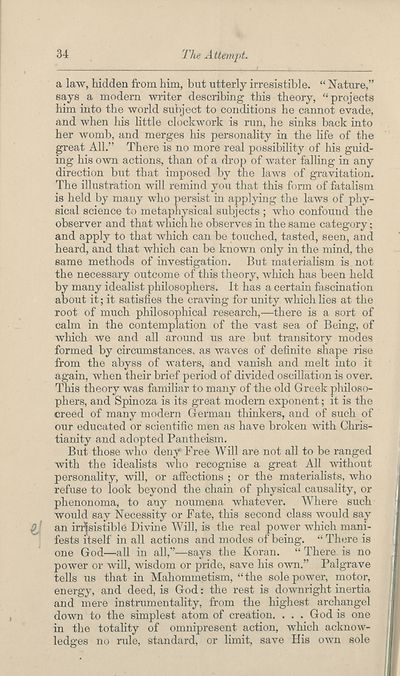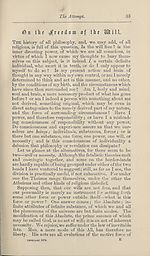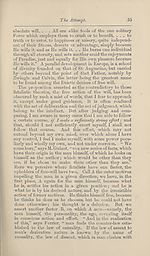Download files
Complete book:
Individual page:
Thumbnail gallery: Grid view | List view

34 The Attempt.
a law, hidden from him, but utterly irresistible. " Nature,"
says a modern writer describing this theory, " projects
him into the world subject to conditions he cannot evade,
and when his little clockwork is run, he sinks back into
her womb, and merges his personality in the life of the
great All." There is no more real possibility of his guid¬
ing his own actions, than of a drop of water falling in any
direction but that imposed by the laws of gravitation.
The illustration will remind you that this form of fatalism
is held by many who persist in applying the laws of phy¬
sical science to metaphysical subjects ; who confound the
observer and that which he observes in the same category;
and apply to that which can be touched, tasted, seen, and
heard, and that which can be known only in the mind, the
same methods of investigation. But materialism is not
the necessary outcome of this theory, which has been held
by many idealist philosophers. It has a certain fascination
about it; it satisfies the craving for unity which lies at the
root of much philosophical research,—there is a sort of
calm in the contemplation of the vast sea of Being, of
which we and all around us are but transitory modes
formed by circumstances, as waves of definite shape rise
from the abyss of waters, and vanish and melt into it
again, when their brief period of divided oscillation is over.
This theory was familiar to many of the old Greek philoso¬
phers, and Spinoza is its great modern exponent; it is the
creed of many modern German thinkers, and of such of
our educated or scientific men as have broken with Chris¬
tianity and adopted Pantheism.
But those who deny Free Will are not all to be ranged
with the idealists who recognise a great All without
personality, will, or affections ; or the materialists, who
refuse to look beyond the chain of physical causality, or
phenonoma, to any noumena whatever. Where such
would say Necessity or Fate, this second class would say
£^[ an irrtsistible Divine Will, is the real power which mani¬
fests itself in all actions and modes of being. " There is
one God—all in all,"—says the Koran. " There is no
power or will, wisdom or pride, save his own." Palgrave
tells us that in Mahommetism, "the sole power, motor,
energy, and deed, is God: the rest is downright inertia
and mere instrumentality, from the highest archangel
down to the simplest atom of creation. . . . God is one
in the totality of omnipresent action, which acknow¬
ledges no rule, standard, or limit, save His own sole
a law, hidden from him, but utterly irresistible. " Nature,"
says a modern writer describing this theory, " projects
him into the world subject to conditions he cannot evade,
and when his little clockwork is run, he sinks back into
her womb, and merges his personality in the life of the
great All." There is no more real possibility of his guid¬
ing his own actions, than of a drop of water falling in any
direction but that imposed by the laws of gravitation.
The illustration will remind you that this form of fatalism
is held by many who persist in applying the laws of phy¬
sical science to metaphysical subjects ; who confound the
observer and that which he observes in the same category;
and apply to that which can be touched, tasted, seen, and
heard, and that which can be known only in the mind, the
same methods of investigation. But materialism is not
the necessary outcome of this theory, which has been held
by many idealist philosophers. It has a certain fascination
about it; it satisfies the craving for unity which lies at the
root of much philosophical research,—there is a sort of
calm in the contemplation of the vast sea of Being, of
which we and all around us are but transitory modes
formed by circumstances, as waves of definite shape rise
from the abyss of waters, and vanish and melt into it
again, when their brief period of divided oscillation is over.
This theory was familiar to many of the old Greek philoso¬
phers, and Spinoza is its great modern exponent; it is the
creed of many modern German thinkers, and of such of
our educated or scientific men as have broken with Chris¬
tianity and adopted Pantheism.
But those who deny Free Will are not all to be ranged
with the idealists who recognise a great All without
personality, will, or affections ; or the materialists, who
refuse to look beyond the chain of physical causality, or
phenonoma, to any noumena whatever. Where such
would say Necessity or Fate, this second class would say
£^[ an irrtsistible Divine Will, is the real power which mani¬
fests itself in all actions and modes of being. " There is
one God—all in all,"—says the Koran. " There is no
power or will, wisdom or pride, save his own." Palgrave
tells us that in Mahommetism, "the sole power, motor,
energy, and deed, is God: the rest is downright inertia
and mere instrumentality, from the highest archangel
down to the simplest atom of creation. . . . God is one
in the totality of omnipresent action, which acknow¬
ledges no rule, standard, or limit, save His own sole
Set display mode to: Large image | Transcription
Images and transcriptions on this page, including medium image downloads, may be used under the Creative Commons Attribution 4.0 International Licence unless otherwise stated. ![]()
| Ladies' Edinburgh Debating Society publications > Attempt > Volume 10 > (44) Page 34 |
|---|
| Permanent URL | https://digital.nls.uk/104310374 |
|---|
| Attribution and copyright: |
|
|---|

